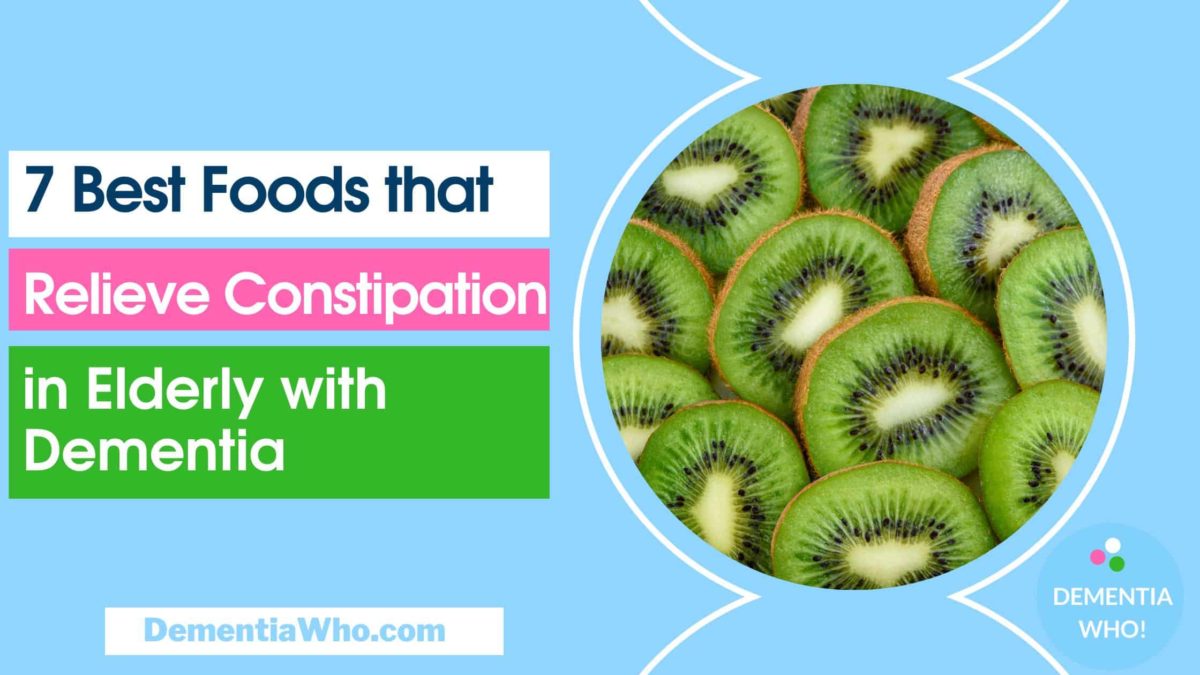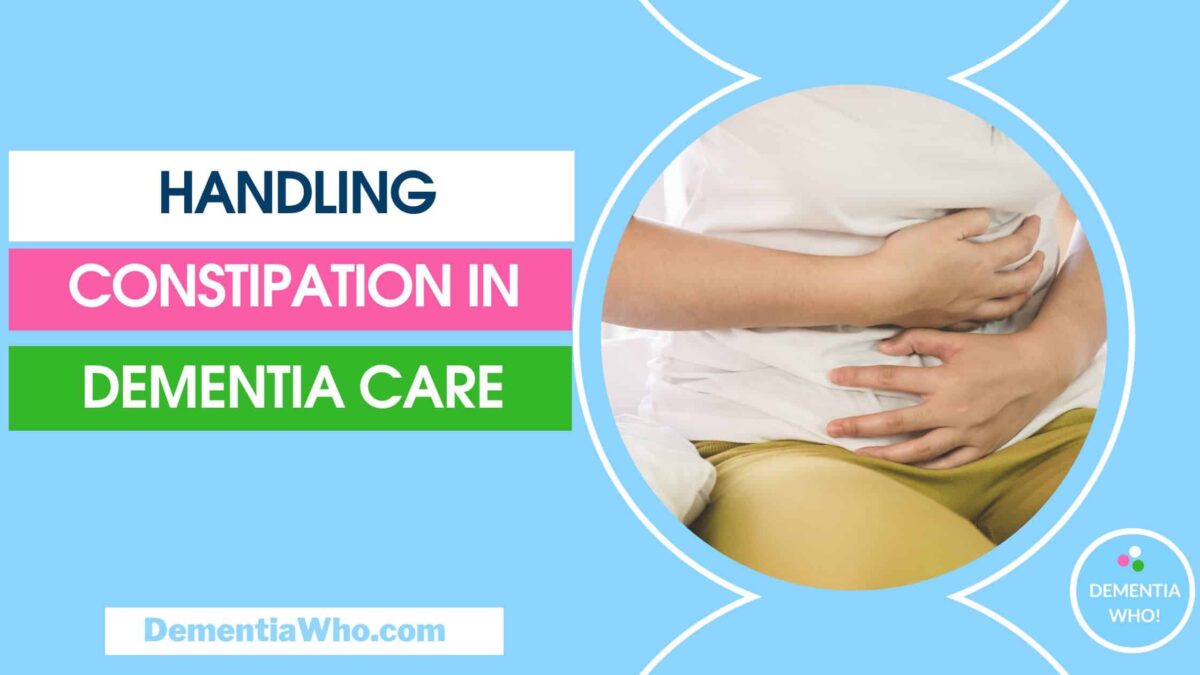Chronic constipation is a common issue for the elderly and, when combined with dementia, can be challenging to manage. The best way to control constipation is through healthy lifestyle changes, foods that relieve constipation and increasing physical activity like exercise.
The best foods that relieve constipation in the elderly with dementia generally have high fibre and high water content. Choose food types that are easier to swallow, are usually sweeter and help move food through the colon by softening or bulking to relieve constipation without straining and helping to evacuate fully.
But for someone elderly with dementia, it may be exacerbated by an inability to understand the source of discomfort or contributed through issues like balance, loss of taste, dehydration, medication etc. You can read more in this article ‘Constipation in the Elderly with Dementia’, which explores the types and causes of constipation.

1. Prunes (dried plums)
These are a great natural stimulant and the best for quick results when there is no faecal impaction or other disorders. Prunes can work quickly. You can eat them as dried, tinned or juiced.
A study showed that prunes were more effective than psyllium husk in helping constipation.
Prunes contain sugar alcohol called sorbitol, a natural laxative, which is the primary reason this works for constipation. The juice works very quickly vs the dried fruit for us but can cause stomach cramps if you take too much, start slowly and build up until you get a movement. We moved to dried fruit with yoghurt, which takes a little longer to start working, but eating daily can help promote regular bowel movements.
Beware of any issues with diabetes if using the prune juice as it’s a much higher sugar item for people with diabetes.
2. Kiwi Fruit
Kiwi fruit was found to be more successful in relieving constipation in a recent study beating out psyllium husk and prunes, and was better tolerated with fewer adverse effects. They had reduced abdominal pain and bloating when eating 2 kiwis a day. They help soften stools, have high water content, fibre to help with slow transit and have digestive enzymes that can help break down food.
3. Chia Seeds
Chia seeds are an excellent omega 3 source, and have high fibre content. They can be eaten whole and pass through your digestive tract, or ground down and mixed with liquid to make gelatinous/pudding.
Chia seeds can absorb a lot of water, so it’s best to add water to them first so it doesn’t draw water from your colon. They can help to loosen and get things moving. The texture can be an acquired taste for some. It can be sweetened in pudding format and made more palatable, especially for those with dementia.
You can try them in a pudding, mixed into smoothies or add them to your oatmeal for breakfast or use them as an egg replacement in most baking items.
.
4. Flaxseeds
Flaxseeds, also known as Linseeds, are another natural remedy for constipation. These seeds have a high level of fibre that helps improve digestion and helps the passage of food through your system.
The seeds can be eaten whole or ground up. Again they can retain a lot of water if soaked before being added to foods and help soften and ease the transit of stools. If you eat them whole, sprinkled over salads, for example, drink extra water.
Don’t overconsume these high fibre foods as they are unsuitable if you already have a blockage. Otherwise, they can be a gentle laxative that can be added to your daily routines to promote bowel movement & improve stool frequency.
This NHS leaflet, ‘The use of Golden Linseed (Flax seeds) for Constipation,’ explains more and how to incorporate them into your diet. They can take 12-24 hrs to start working.
5. Coffee
Coffee first thing in the morning can be a stimulant for some, but be wary if you’re dehydrated. Coffee can increase the urge to go, stimulating the digestive tract muscles.
Coffee has diuretic effects from caffeine, so you must be careful and balance that out by drinking more water.
When compared to drinking warm water, studies have found that
“Caffeinated coffee was 60% more effective than water at stimulating colonic motor activity and 23% more impactful than decaf”.
Why does coffee make you poop? CNN Health
6. Probiotic
Probiotics help the balance of gut bacteria. In some cases, harmful bacteria can outweigh the good in our guts. When we’re run down, recovering from illness, or even taking antibiotics, our good gut bacteria is reduced & out of balance. Probiotics can help bring your healthy gut bacteria back into balance & can improve your digestion.
A study found that :
“Probiotics may improve whole gut transit time, stool frequency, and stool consistency, with subgroup analysis indicating beneficial effects of B. lactis in particular.” Consolidating the data from other trials, they found that “overall, probiotics significantly reduced whole gut transit time by 12.4 hours …. and increased stool frequency by 1.3 bowel movements/wk”
The American Journal of Clinical Nutrition
There are many forms of probiotics that you can take, like food products Kefir, Sauerkraut, Miso, Kombucha, or Kimchi or take it in supplemental form like Optibac or Symprove. Again start slowly not to have any adverse reactions.
7. Apples and Pears
The one thing that all health professionals promote is to eat more whole grains, legumes, fruit and vegetables. We’ve talked about how prunes/plums and kiwis can help with constipation, but you can also get relief by eating apples and pears. High in fibre, like most fruits and vegetables, they also have another element that helps with constipation.
Apples have pectin, a soluble fibre found in the skin and pips of apples that absorb water, bulk up your stools & make it softer to move down the bowel, making it easier to pass stools.
Pears have naturally occurring sorbitol that can improve gut health and constipation. Sorbitol can also be artificially produced and used as a sweetener like chewing gum, where you have warnings against large consumption as it can cause diarrhea! So as long as you don’t have too many pears in one go, you’ll be alright, but adding them to your diet can help with constipation. Prunes have the highest level of sorbitol and so work more quickly.
There are many more foods that can help with constipation. Eating more legumes and pulses, assorted vegetables, and becoming more plant-based – all can help if you’re constipated unless it’s caused by things like medication, nerve or spinal damage, pelvic floor issues, Irritable Bowel Syndrome etc. Be careful as some food types can result in bloating and gas production & may not be suitable.
For further help, the article Tips to Manage constipation in the Elderly with Dementia provides ideas other than food on how to improve constipation.
Finally, if symptoms don’t improve, seek out your doctor for further medical advice. In the meantime, avoid highly processed foods, protein powders, dairy (yoghurt being the exception), red meat, bananas, cheese etc., that are likely to worsen constipation and increase your fluids.
Hopefully, these foods that relieve constipation in the elderly with dementia will help! Good luck!












